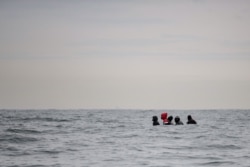The British government will unveil Tuesday a new immigration bill making it a criminal offense for asylum-seekers to enter Britain without permission. Under the terms of the proposed legislation, anyone caught entering illegally for whatever reason could face a prison term of up to four years.
The move is designed to dissuade migrants crossing the English Channel in small boats and dinghies. People smugglers will also face much heavier jail terms with those found guilty facing life sentences, up from a current maximum of 14 years.
The country’s interior minister, Priti Patel, said the legislation is intended to help fix what he described as Britain’s “broken asylum system.”
Migrants currently arriving from France in dinghies are picked up by border authorities and are then held in detention centers or hotels until their application for asylum is processed. “Our new plan for immigration is fair but firm. We will welcome people through safe and legal routes while preventing abuse of the system, cracking down on illegal entry and the criminality associated with it,” Patel said last week.
Under the toughened rules, migrants who aren’t prosecuted but who enter illegally will only be granted temporary status in Britain and will have no access to state benefits unless they are destitute. Only asylum-seekers who arrive via official government refugee schemes will have the opportunity to settle in Britain.
Criticism
The fresh legislation, which initially goes before the House of Commons Tuesday, is coming under fierce criticism from rights campaigners and refugee organizations. Nearly 6,000 migrants reached Britain in the first six months of this year by making the perilous channel crossing. The total figure for 2020 was 8,417.
Officials said the draft law is “sending a clear message to migrants thinking about paying people smugglers to make dangerous and illegal journeys to the UK.” But rights campaigners say there are too few legal schemes available for asylum-seekers to make it to Britain.
“While the Home Office continues to make no safe and legal routes to the UK available for those claiming asylum, some people will continue to be forced to risk their lives to do so — including in small boats across the Channel,” Steve Valdez-Symonds, Amnesty International’s refugee and migrant rights director, said in a statement.
“Instead of peddling deliberately misleading myths and untruths about asylum and migration, the Home Office should be establishing safe routes for those few people escaping persecution who wish to seek asylum here,” he added.
Toughening immigration rules was a key manifesto pledge in the 2019 election by the ruling Conservatives, who secured a much-increased parliamentary majority. The draft law appears also to be in line with public sentiment, according to recent opinion surveys.
A survey by the pollster YouGov found that 61% of respondents surveyed believed illegal migrants should be banned from claiming asylum, if they had entered Britain illegally through a “safe” country where they could have settled. British government officials say those traveling across the English Channel on small boats have come via a safe European Union country in which they could have claimed asylum and accuse the migrants of “asylum shopping.”
New asylum process
The new Nationality and Borders Bill will likely also pave the way for British authorities to send refugees and migrants overseas for the processing of their asylum claims. Interior minister Patel has held talks with counterparts in Denmark, which passed legislation earlier this year allowing the government there to establish an offshore immigration processing center for asylum-seekers.
The Times newspaper reported last month that Danish and British officials had talked about sharing a processing center, possibly in Rwanda. U.N. refugee agency officials have criticized asylum offshoring dubbing it “burden-shifting rather than responsibility-sharing.”
Nick Thomas-Symonds, as senior Labour Party lawmaker, said Britain main’s opposition party will vote against the new legislation because he says the proposals are “unconscionable.” “This is yet more evidence of the lack of compassion and competence at the Home Office under Conservative ministers,” he said.
He said the Conservative government has “failed to reopen safe and legal routes, failed to reach an effective agreement with France to deal with criminal gangs” behind the people smuggling.
EU countries have also discussed setting up offshore centers to process asylum-seekers, but agreement has been elusive. They have studied Australia’s asylum system, where migrants and refugees who arrive by sea are sent to offshore centers in neighboring countries, including Papua New Guinea. Australia has seen few sea arrivals since 2013.






